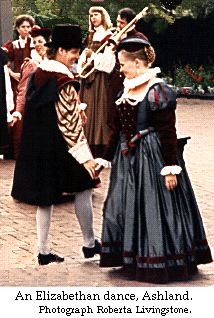Elizabethan court musicians
Most of the musicians included here wrote both for the church and the Court. They wrote lute songs and airs, madrigals, catches (rounds); and music for virginals, recorders or viols.
Click on any of the following names to read about the composer:
- John Dowland (music sample)*
- Thomas Campion*
- Thomas Morley (music samples)*
- Robert Johnson (music samples)*
- Thomas Weelkes (music sample)*
- Henry VIII? (music samples)*
Footnotes
-
John Dowland
Like Campion, Dowland (1562-1626) composed both words and music for lute songs. His Lachrymae, a collection of dances, was particularly popular. He spent several years as Court lutanist for King Christian IV of Denmark before returning to a Court appointment for Charles I in London.
His song "Come Again" sets a typical lyric of the period. Listen to an electronic (midi) version of the melody:
Come again,
Sweet love doth now invite
Thy graces that refrain
To do me due delight,
To see, to hear, to touch, to kiss, to die
With thee again in sweetest sympathy
Come again,
That I may cease to mourn
Thro' thy unkind disdain;
For now, left and forlorn,
I sit, I sigh, I weep, I faint, I die
In deadly pain and endless misery.
Gentle Love,
Draw forth thy wounding dart,
Thou canst not pierce her heart,
For I that to approve,
By sighs and tears more hot than are thy shafts,
Did tempt while she for triumph laughs.Dowland's madrigal "If my complaints" (midi file) is available on line.
-
Thomas Campion
A fine lyricist as well as composer, Campion (1567-1620) wrote songs for lute, and composed words and music for Court masques staged by Inigo Jones after his quarrel with Ben Jonson. He also wrote a treatise on counterpoint, and on poetry.
Observations in the Art of English Poesie (Richard Bear, Oregon), available on line.
-
Thomas Morley
Morley (1557-1602) was a versatile musician and publisher. He composed both religious and secular music (he was organist at Saint Paul's Cathedral), and wrote a treatise on counterpoint, A Plaine and Easie Introduction to Practicall Musick (1597); in addition, the work provides some information about the way music was performed at the time.
This page includes three pieces Morley wrote:
- His setting of "It Was a Lover and His Lass," from As You Like It is one of the few original pieces of music from the plays which have survived.
- one of his many madrigals, "Springtime," is played by a trio of recorders.
- and the song "O mistris mine" is arranged for (electronic) winds in this version:
Morely's "Springtime mantleth every bough" (midi file) is available on line.
-
Robert Johnson
Another Court lutanist, Johnson (c.1580-c.1634) composed the original settings for some of Shakespeare's songs, notably those from The Tempest: "Where the Bee Sucks"
"Full Fathom Five."
He also composed a number of "catches" or rounds, often drinking songs like the one here, "He That Will an Alehouse Keep."
-
Thomas Weelkes
Weelkes (1575-1623) was one of those who combined the writing of sacred and secular music: he was organist of Winchester College and Cathedral, and wrote services for them; but he is best known for his collections of madrigals, some of which are daring in their harmonic experiments.
"As Vesta Was from Latmos Hill Descending," a complex, six-part madrigal, is one of the finest musical tributes to Queen Elizabeth published in The Triumphs of Oriana (1603).
"When Kemp Did Dance Alone" celebrates the actor in Shakespeare's company who specialized in parts for the clown. In this recording it is played by a trio of recorders.
-
Henry VIII?
Well, he was not exactly an Elizabethan court musician, but Henry VIII was certainly a musician and composer. Three of his pieces are played here by a trio of recorders: the cheerfully extrovert "Pastime with Good Company":
A short, reflective "Fantasie"
And a love song, "Without Discord and Both Accord."
The contrast between Henry's music and the others on this page does not just reflect the fact that he was a king and they were professionals, but that he was writing in a much earlier, and less sophisticated idiom.
